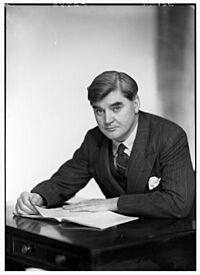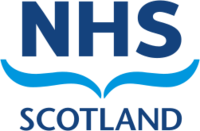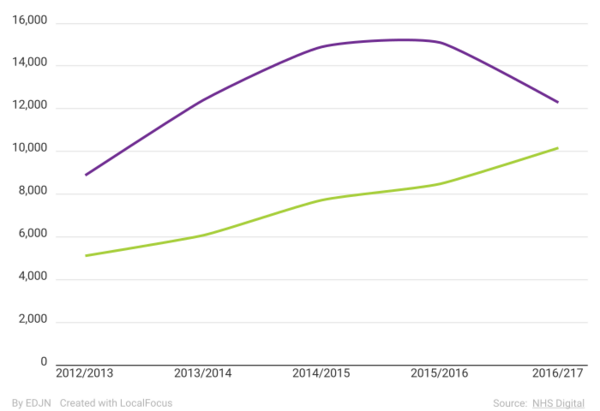National Health Service facts for kids
The National Health Service (NHS) is the name for the four healthcare systems in the United Kingdom. These systems are funded by the public. They include the National Health Service (England), NHS Scotland, NHS Wales, and Health and Social Care (Northern Ireland).
The first three systems started in 1948 after the Second World War. NHS Wales began a bit later in 1969. The main ideas behind the NHS were that healthcare should be for everyone, available everywhere, and free when you need it.
The NHS offers many health services without charge to people living in the UK. However, there are small charges for things like dental treatment and eye care. In England, patients also pay a small fee for prescriptions, but some people, like those over 60, do not have to pay.
In 2015–16, these four services together employed about 1.6 million people. Their total budget was around £136.7 billion. By 2024, the total number of people working in the UK health sector was about 1.5 million.
The NHS buys a lot of medicines and other supplies. This large buying power helps keep prices lower, even around the world. Other countries sometimes use the UK's decisions to help them decide which medicines to pay for.
Contents
History of the NHS

People started talking about a single medical service a long time ago, even in 1909. In 1912, the Highlands and Islands Medical Service in Scotland began. It offered healthcare at a very low cost, which was a bit like an early version of NHS Scotland.
In 1934, a politician named Somerville Hastings suggested that the Labour Party should create a state health service.
After a report in 1942 suggested creating "complete health services," many political parties agreed that a National Health Service was a good idea. Henry Willink, a Conservative MP, also supported this idea in 1944.
When Clement Attlee's Labour Party won the election in 1945, he chose Aneurin Bevan to be the Health Minister. Bevan worked hard to shape the NHS. Laws for the NHS were passed for England and Wales in 1946 and Scotland in 1947. Northern Ireland also passed its own health service law in 1947.
NHS Wales became separate from NHS England in 1969. The Second World War actually helped the idea of a national health service. During the war, many hospitals were brought together under one organization to prepare for injuries. This showed that a national hospital service was possible.
The NHS was created because people believed that everyone should get healthcare, no matter how much money they had. When it started on 5 July 1948, it had three main rules:
- It should help everyone.
- It should be free when you need it.
- It should be based on what care you need, not what you can pay.
Three years after the NHS began, Aneurin Bevan resigned from the government. He disagreed with charging for things like dentures and glasses. Later, prescription fees were introduced, then removed, and then brought back with some people not having to pay. These charges were some of the first disagreements about the NHS.
The NHS has often been shown in British films, TV shows, and books. It was even a big part of the 2012 London Summer Olympics opening ceremony. It was called "the institution which more than any other unites our nation."
Who Can Use the NHS?
Some health services are free for everyone. This includes treatment in the emergency room, registering with a family doctor (GP), and going to GP appointments. Treatment for some infectious diseases, forced psychiatric treatment, and some family planning services are also free.
Most people who live in the UK can use the NHS without paying the full cost. However, there are standard charges for NHS dentistry and eye care in all four UK health services. Most patients in England also pay for prescriptions, but some people do not have to.
People who do not usually live in the UK might have to pay for services. There are some exceptions, like refugees. If you do not qualify for free treatment, you might be asked to pay beforehand or promise to pay later.
Some other groups of people do not have to meet the usual living requirements. This includes certain government workers, armed forces members stationed overseas, and missionaries working for UK-based organizations.
Citizens from EU or European Economic Area (EEA) countries with a valid European Health Insurance Card (EHIC) can get free emergency NHS treatment. This also applies to people from certain other countries that have special healthcare agreements with the UK.
People applying for a visa or immigration for more than six months usually pay an immigration health surcharge. After paying this fee, they can get treatment like a resident. Some people do not have to pay this fee, such as health and care workers and their families, some armed forces families, and victims of slavery or domestic violence. In 2024, the fee was £776 per year for students and those under 18. For most other applicants, it was £1035.
How the NHS is Funded
The NHS gets its money mainly from general taxation and National Insurance contributions. About 1% of its funding comes from patient charges for some services.
In 2022/23, about £181.7 billion was spent on health services in England. Most of this money (over 94%) went towards staff salaries and medicines.
For 2024/25, NHS Wales planned to spend £11.74 billion on health and social care. This was about 49% of its total budget.
Scotland's budget for health and social care in 2024/25 was £19.5 billion.
Northern Ireland's health budget for 2024/25 was £7.3 billion.
NHS Staff
The NHS in England is the biggest employer in Europe. About one in every 25 adults in England works for the NHS. Nurses make up the largest group, with over 330,000 employees. Next are clinical support staff (290,000), scientific and technical staff (163,000), and doctors (133,000).
Challenges for the NHS
Money and Costs
How the NHS is funded is often a big topic during elections. It was especially looked at closely during the Covid-19 pandemic.
In July 2022, it was reported that health spending in the UK was costing about £10,000 per household. This was said to be one of the highest shares of a country's total income spent on health in Europe.
The Labour Government elected in 2024 said their plan was that the "NHS is broken." They announced a review of current problems and a new "10-year plan" for the NHS.
The cost of social care is also expected to rise. Experts say that while people are living longer, the health and social care system needs enough money and staff to ensure people live longer with a good quality of life.
Staff and Waiting Times
In 2018, experts calculated that the number of medical training places needed to double by 2030. This was to make sure there were enough doctors, especially since many work part-time.
In June 2022, a survey of over 20,000 nurses found that only a quarter of shifts had the right number of registered nurses working.
The NHS might also have a shortage of general practitioners (GPs). From 2015 to 2022, the number of GPs decreased, and many who still work have switched to part-time.
In June 2023, a plan was announced to train more doctors and nurses and create new roles in the health service.
In September 2024, the Welsh and UK governments announced they would work together to reduce NHS waiting lists in England and Wales. This partnership aims to share good ideas and solve common problems.
Mental Health Support
Across the UK, one in four patients waits more than three months to see an NHS mental health professional. Some even wait a year or more. Reports show that mental health services for children and young people might not be able to meet the growing need, even with more funding. Currently, only about a quarter of young people who need mental health services can get help from the NHS.
Being Inclusive
In 2024, some NHS hospitals asked radiographers to ask all male patients aged 12 to 55 if they were pregnant. This was done for inclusivity reasons and was widely discussed in the news.
How Well the NHS Performs
The performance of the NHS is usually looked at separately for England, Wales, Scotland, and Northern Ireland. Since 2004, surveys have compared the NHS to health systems in 11 wealthy countries. The UK usually ranks highly. In 2021, the NHS dropped from first to fourth place because it had fallen in areas like how easy it is to get care and fairness.
A study in 2010 compared healthcare systems in seven rich countries. It placed the NHS second, saying it was more efficient than systems in Germany, Canada, and the United States.
A 2018 study looked at the NHS's 70th anniversary. It found that the main weakness of the NHS was health outcomes. For example, deaths from cancer, heart attacks, and strokes were higher than in similar countries. However, the NHS was good at protecting people from high costs when they were sick. Waiting times were about average, and managing long-term illnesses was better than in other countries. The NHS was also efficient, with low administrative costs.
In 2019, a study found that Britain spent the least on health per person compared to other developed countries. It also had the highest number of deaths that could have been prevented with quick treatment.
More than 130,000 deaths in the UK since 2012 could have been prevented if public health efforts had not slowed down.
Overall satisfaction with the NHS fell in 2021 to its lowest level since 1997. The biggest reasons for this drop were long waiting times for hospitals and family doctors.
Public Opinion of the NHS
In 2016, polls showed that many people supported paying more taxes to fund the NHS. For example, 70% of people were willing to pay an extra penny in income tax if the money was guaranteed for the NHS.
A 2018 poll showed that 74% of people in the UK believed there were not enough nurses.
The NHS is often ranked as the institution that makes people proudest to be British, even more than the royal family or the Armed Forces. Nurses and doctors are also seen as some of the most trustworthy professions in the UK.
In November 2022, a survey found that only a third of people thought the NHS provided a good service nationally. Most people (82%) believed the NHS needed more funding. Many also expected care standards to get worse. The main priorities for people were sorting out staff pressure and increasing staff numbers. Despite these concerns, most people still believe the NHS should be free, available to everyone, and funded by taxes.
In 2020, the NHS gave medical advice to help fight COVID-19. It also worked with technology companies to create computer tools to help manage the pandemic. The NHS also added COVID-19 information to its 1-1-1 helpline. After being treated for COVID-19, British Prime Minister Boris Johnson said the NHS "saved my life." During this time, the NHS made big changes to get ready for the pandemic.
On 5 July 2021, Queen Elizabeth II gave the NHS the George Cross. This is a very high award for bravery for civilians. The Queen said the award was for all NHS staff, past and present, for their "courage, compassion and dedication" during the pandemic.
In October 2022, the NHS worked with a tech company to help with mental health challenges made worse by the pandemic. They used AI software to help healthcare providers with patient assessments and treatment.
Hospital Beds
In 2015, the UK had 2.6 hospital beds for every 1,000 people. In September 2017, it was noted that the number of NHS hospital beds in England was 142,000. This was less than half the number from 30 years before.
Use of Other Treatments
Since 2000, the NHS has sometimes been criticized for offering or trying out certain alternative treatments. For example, homeopathy has been funded by the NHS since it started in 1948.
The NHS also looked into a treatment called "the Lightning Process" for children with CFS/ME. Also, guidelines for low back pain have suggested that doctors could offer acupuncture.
Care Mistakes
A 2024 report said that the NHS spends about £14.7 billion a year treating patients in England who were hurt by care mistakes.
NHS Music Releases
The NHS has released several charity songs:
- 2015: National Health Singers – "Yours"
- 2015: NHS Choir – "A Bridge Over You"
- 2018: NHS Voices – "With a Little Help from My Friends"
- 2018: National Health Singers – "NHS 70: Won't Let Go"
- 2020: NHS and keyworkers – "You'll Never Walk Alone"
See also
 In Spanish: Servicio Nacional de Salud (Reino Unido) para niños
In Spanish: Servicio Nacional de Salud (Reino Unido) para niños
- Department of Health and Social Care
- History of the National Health Service (England)
- History of NHS Scotland
- History of NHS Wales
- National Care Service
- Private providers of NHS services
- Special health authority
- Criticism of the National Health Service (England)
- Manx Care
General
- Healthcare in the United Kingdom
- Health in the United Kingdom
- History of public health in the United Kingdom
 | May Edward Chinn |
 | Rebecca Cole |
 | Alexa Canady |
 | Dorothy Lavinia Brown |






